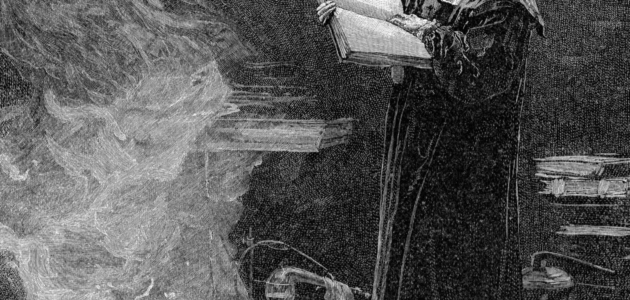
Doctor Faustus (Marlowe)
Christopher Marlowe’s The Tragical History of the Life and Death of Doctor Faustus is known for its dramatic plot in which the title character sells his soul to the devil in return for greater knowledge and power. It was first performed in the 1590s, making it one of the oldest plays still widely performed. In modern times, the play has seen a range of contemporary interpretations. The idea of Dr Faustus and his story has entered the cultural subconscious; when there is a trade with the devil, we commonly refer to the story or character as ‘Faustian’.
The plot is centred on Doctor Faustus, an academic who feels that he has reached the pinnacle of study in all of his subjects. Frustrated, he sends for two famous magicians, in order to learn magic. They teach him, but warn him that he will have to give up his other studies to fully dedicate himself to the study of magic. Faustus revokes his Christian baptism and engages in an incantation and ceremony that manages to summon up a demon, Mephistopheles, who he sends to Lucifer (the devil) to offer him his soul if he will give him Mephistopheles as a servant for 24 years. Mephistopheles warns him about hell, but Faustus is determined.
When the demon returns to tell Faustus that his offer has been accepted, he wavers, unsure of whether to repent or continue. When he signs, in blood, that he agrees to the contract, the words “Oh man, fly” appear on his skin, but so too does a book of spells and many gifts, as well as answers to his questions about the universe. The only question Mephistopheles does not answer is about who created the universe.
Faustus sets off to enjoy his new powers, travelling through the courts of Europe playing tricks (most notably on the Pope) and dazzling all who see his power. While he is casting spells and gaining admiration by summoning famous characters from history and causing mischief (as well as gaining a fair collection of enemies, on whom he has used his magic), as a comedic side-line, his old servant and a clown have managed to harness some limited magical ability of their own.
As the 24 years draws to a close, Faustus devotes himself to pleasure with an apparition of Helen of Troy conjured by Mephistopheles. Only at the very end of the term does he start to fear and repent. He blames Mephistopheles for his damnation, and the demon is happy to accept his part. He warns his fellow scholars and they intercede for him, praying for his soul. Despite this, and Faustus’ own pleading for his soul in a final monologue, the gates of hell open and he is carried off by devils. Some versions of the play have his torn-apart body discovered by his fellow scholars, some have his clothing discovered, and others leave the action offstage. The play ends with a warning to the audience not to fall in the same trap as Faustus.
Doctor Faustus Quotes
Hell is just a frame of mind.
Doctor Faustus
He that loves pleasure must for pleasure fall.
Doctor Faustus

Leave a Reply